So today I ventured out without Shawn as he went to re-teach soap making at the technical school, and I started with a visit to the Padibe Secondary Girls’ School. Deacon David came with me, however, as it’s probably not smart to be a while chick wandering around Padibe. It wouldn’t be terrible, granted, but I’m definitely noticeable here and cannot decipher one dirt road from the next (another thing that amazes me about the people here). We began the morning with a brief meeting with the headmaster who explained the agenda for the day (the headmaster asked that we sit in some classrooms first and evaluate the teachers – yes, I got to be Marty VanHulle for the morning :)) and then we were to have a meeting with him and then with all the teachers.
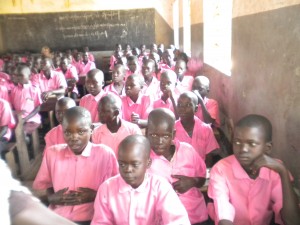 Padibe Primary Classroom I started in the sophomore level agricultural classroom while Deacon David was sent to the religious studies class. I will try to explain the experience as objectively as possible, but it is so hard not to compare all of our initiatives and goals in America with the teaching standard here. Objectively, there was lots of note-taking and direct instruction. No formative assessment, really. No practical application (I was thinking that it would be so great for the students to have their own garden plots to experiment with the items that they are learning about – to really see what sort of weeds grow near the type of bean they are learning about. I was also thinking that some of them are “experts†in regards to the planting and maintaining of certain crops and could present to the other students – but there’s my student-centered American bias getting in the way :)).  It was hard to imagine how copying notes about these things might actually help them in the future with the actual practice of farming. I get it – direct instruction and note-taking, basic content knowledge are both important, but the application to how this knowledge works in real life and could be helpful to them outside of the classroom seems even more important than memorizing these things.
Next stop was in the freshman level physics classroom. It’s so interesting to objectively walk into a classroom, not knowing the teacher or the students at all, and immediately feeling how this class was different – the “x factor†that so many of my education professors and administrators have talked about. The teacher quickly reviewed the material that was taught yesterday before teaching new material. He was fun, conversational, yet professional; he was engaged with the students and both teacher and student “felt felt†by one another. Then, before introducing the lesson for the day (time measurement), he activated prior knowledge by talking about the bells and what they signify, about how we may know what time it is (do you think it’s 6:00 pm right now? How might you guess the passage of time? – and I know what you’re thinking, they’re learning this as freshman?!? I was too.). He was calling on the students to check and see if they understood the material… anyway, I won’t go into detail, but this guy was GOOD. The kids were interested, he had clocks for them to use, he played a game with them in which to engage their interest, and he had good closure to the lesson. I was furiously taking notes about universal things that I was seeing that, from my experience, make a good teacher a good teacher.
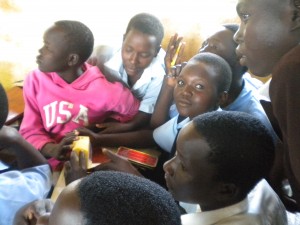 Physics students playing with the Stop Clock So this got me thinking – good teaching is good teaching, regardless, right? And kids, African or American, know who is good and who is not. They feel the “x-factor†that I felt the second I walked into that physics classroom. I started to brainstorm different ways that I could be of service here and, after having a long discussion with the headmaster about what type of initiatives they are trying to implemented here – mainly well planned lessons with clear objectives, formative assessment, student engagement, surprisingly, all things that we talk about in America – I think I may have something to offer these teachers and, subsequently, the students through the sharing of the best practices that I have learned oh-so-well, thanks to my experiences with all of the educational pioneers at PHS.
In addition, the headmaster told me that the government here is requiring that all secondary schools are connected to the internet by 2013, but has not provided computers, generators, or electricity, for that matter! (Ah, the logic of politicians and their educational mandates… tsk, tsk, tsk, as the Ugandan women would say… :)). So I am playing around with ideas about what type of work we can continue to do here with the schools. I mean, obviously, computer and internet connection would be awesome and the impetus for any sort of connection to students and teachers in America. Apparently the electricity and internet are on the way (the poles and lines are up…), and if the government is requiring mandatory computer connectivity, it may be helpful to fund-raise for computers (or maybe even look for computer donations), which would open all sorts of doors for student and teacher collaboration across the world. I also started to think about all of the educational resources that we have back in America and how, while this culture is just starting the movement from “sage on the stage†to a student centered classroom, we have been teaching in this manner since I was first trained as a teacher. So, I am thinking, also, of ideas for professional development for the teachers next summer, and hopefully some sort of eventual partnership between students and teachers (the students here are screaming for it – they want to know and connect with students in American so badly).
I obviously cannot commit to any sort of plan as of right now, but today was a good day for observation and brainstorming. The physical things they need –a huge wall to surround their school (this is, ironically, a priority for so many schools here… AH! The power of post-war fear is unimaginable), a new road, new dormitories, better teacher pay (teachers here make $30/month!!! I must also include that the teachers are striking tomorrow… the day of the government enforced testing… because of the low pay and poor benefits – it’s funny to see this parallel connection here as well.), more chairs and tables, more classrooms, more classroom textbooks (they average about 8 math text books for every 67 students), projectors, ELECTRICITY, a full library – may be a bit of a stretch, but I don’t think that all of the gifts that we are able to give start with huge amounts of money.
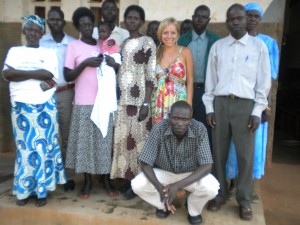 Teachers at Padibe Primary and me We’re starting to get tired and the long days of working with the many projects are starting to wear on us a bit. One more full day in Padibe then we start to head back toward the city (we will spend one night in the park where the lions and elephants and monkeys reside and another night at the seminary in Gulu before we leave) on Thursday. I cannot believe how time has proven to slip through our fingers here. Our plane leaves on Saturday night already! I am starting to get a little home sick, so the timing seems about right. Hope everyone at home is doing well. We miss you!
We also published prior to this about my public shaming over the weekend – check it out if you are interested at the “Our Weekend in Padibe” link on the right.
Hello everyone! I have summed up our first full weekend in Padibe by themes for your mental and organizational convenience:
Music Festival:
Saturday we went to the Lamwo music festival. The day started out well as we were able to “take rest†as they say here and sleep in (we have been going to church with the kids every day since we came at 7:00 am). We had a nice breakfast with father and deacon and then headed over to the event. In comparison, the festival is a mixture of a solo and ensemble competition, a poms competition, and a forensics meet. Schools from all over the area have prepared their best and brightest to perform for the county. Families travel from far away to watch and the students stay in the school classrooms for the two-day endeavor. As usual, wherever we go, we are always put at the front and center of everything; unnecessarily, there are always chairs waiting for us with bottled water atop. It feels like we are Barack and Michelle Obama, which is flattering at the beginning, but can also get, admittedly, a bit tiring. We could be the worst white people on earth, you know? But wherever we go we are “most welcome†as they say, and it is very overwhelming. Â
In drama, the students are to create their own play based on the theme for the overall competition. This year, the students’ pieces were based on the unification of East Africa. The plays included full costumes and scenery, and I couldn’t help but think of my little summer school theater kids back in Pewaukee who were performing their plays at the exact same time back in the States. My heart was with them as I watched these kids pour their hearts in their little dramatic creations. The plays were also in English, which was easier for us to understand. The sight reading competition was a bit tedious to watch (Shawn had never seen anything like that before, so I had fun explaining how solo and ensemble competitions work in America, as I spent many years with the Greendale High School choir in front of judges at local competitions), but Fr. Romano (one of my favorites so far, a lively man with a strong faith and an incredibly hilarious British/African influenced sense of humor) is quite a jokester and was not afraid to share his sly comments with me as my fellow audience member.
It is quite hard to explain the traditional dance competition. The students come to the middle of the circle in completely authentic traditional attire, with their own handmade drums and harpsichords and perform one of several traditional dances (there is the royal dance, the funeral dance, the courting dance, etc.). Each dance includes chanting and tells a general story. I was so impressed by the rhythm and passion of the kids. Their body movements are unlike any I’ve ever seen in America – who knew people could extend their necks that far!). I got quite a few on video, but I will have to post those in America, as our internet connection here is about as consistent and reliable as the meteorologists in Uganda, if you know what I mean.Â
Unfortunately, the day ended a little awkwardly: as we were leaving to go before everyone else, we heard quite a few people clicking their tongues (the Acoli method of disapproval and public shaming). Shawn asked Tommy (one of our hosts) if the people were angry that we were leaving early and he said that they were not pleased with my knee-length dress. My stomach dropped and I immediately felt terribly ashamed (I guess the tongue-clicking works! Maybe we’ll have to implement as a disciplinary method at PHS ). I apologized to our host and ran home STAT to change. I immediately explained the situation to the nuns who I am staying with (assuredly, they had noticed my awkwardness but not mentioned it – I wondered why one kept saying that Americans must like small dresses – it all started to click at this point), and they nearly fell to the ground laughing as I kept repeating “In America, tis okay!†(They only really understand me if I speak with a British accent as theirs is influenced by this). I would love for them to see why we have the “finger-tip policy†in our dress code at PHS – it would corrupt them entirely. As a born people pleaser, I felt sick about it for a good thirteen minutes, but butterfly hugged myself, thought about what all of my good friends in America would say, and laughed about it with Shawn (he was so wonderful about helping me through my 13 minutes of shame :)); he even told our host how it would be considered rude in America to publicly judge someone else, even though, shamefully, we privately do the same thing). I have about four long dresses and you can bet that I am just going to keep re-wearing them until we leave.
Sunday Morning Church Service
The Sunday morning church service was lovely. The place was packed (children sat on the floor and overflowed out into the surrounding field), and people came from all over the area (I saw people from Madi Kiloc, Paloga, and Lokung – places that took us at least 20-40 minutes to get to by car! These Christians are dedicated, man!), the singing was beautiful and lively (I’m thinking we need to adopt a copy of the Acoli hymns at our church!), and the homily was SO LONG… in a foreign language. It was interesting to see Fr. Romano excitedly talking about who knows what. He did summarize the homily, 45 minutes later, in English though which was nice. I was thinking that if people travel all that way and have to go back, you kind of have to make it worth their while. Shawn and I were asked to come speak to the people, which we did, so we told the parishioners that we bring the love and blessings of all the students at PHS and the people of Three Holy Women (of which they probably understood about 1/3 of; Shawn says that trying to understand our American English is like trying to understand a heavy Scottish accent, so I try to talk verrrrrry slowwwwwly). After church, the counsel members brought us ANOTHER chicken and huge bag of grains. These wonderful people just keep giving and giving and giving! It is very humbling.Â
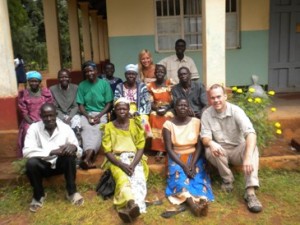 The church counsel, Shawn and I. We then had a large, three and a half hour meeting with the Global Solidarity Group in which we started some strategic project planning for the future (more and more talk of the sunflower press initiative, of course! It’s the word on the street these days!), and also did some assessment of the current projects at hand – the internet café, the water filtration project, and the soap-making instruction. We ended the day with an amazing meal at Tommy’s (our host who is coming to America this fall!) house, and it truly was the best meal that I’ve had here – fresh turkey from the yard, sweet potatoes, a peanut sauce mixed with some greens, millet, fried bread, and many more things that remain a mystery to me in both content and definition, but they were unbelievably delicious.Â
After dinner, we went to visit the HIV clinic to meet some of the patients or clients as they call them. They told us about the 400-some people here who are infected with the virus and all of the services they provide. We were even lucky enough to meet some of the clients and hear their stories (two women had lost their husbands to AIDs and are left with the children and all that comes with maintaining a house as a single mother – something I cannot even imagine, when farming, working, and providing for school fees, etc. are all a part of maintaining family here). We were inspired by their stories and bravery and truly impressed with the good work of the clinic. Thank God for the immunizations and education provided from overseas to help those with HIV – it is truly doing wonders in the realities of these communities.
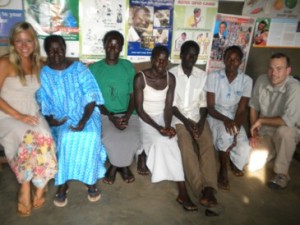 Our visit to the HIV clinic. Afterward, Shawn and I each planted a tree, as he came up with this great idea of doing so every time that we bring a new parishioner to Africa, or an African parishioner to America (he’s so smart :)). So, next year when we come we will be able to see the growth and progression of the trees which will symbolically represent our relationship with the people here across the world. We’re looking forward to taking pictures of Tommy as he plants an apple tree in good ‘ole Milwaukee, WI.Â
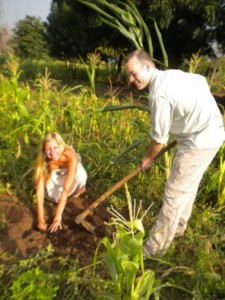 Shawn and I plant my tree. Soap-Making Instruction
Today was the infamous day of soap-making instruction. Shawn and I have already practiced two recipes here with sustainable materials (as close as we can get, at least), as the people of the church are looking to make and sell the soap. The people came from all over the area with their babies on their backs and their jerry cans of water and cups (man, they sure know about efficient travel and appropriate packing!), and watched the master, Alexander Shawn – last names first here – teach the theory and complete the demonstration. I am gradually getting to know the names of the parishioners, but am attempting to make a homemade “facebook†with my camera that allows me to track them all (I always feel so bad when I recognize a woman, have eaten with her, received a chicken from her, and still cannot remember her name). The demonstration went well and the people seem interested, so here’s to soap-making! :) Alexander Shawn was asked to come to the technical school tomorrow to teach once again, as more villagers are interested but could not make the time slot.
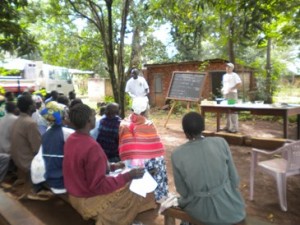 Instructor Alexander Shawn teaches the people to make soap. School Visits
 Lastly, we spent the afternoon visiting some schools in the area, which is on the program for the rest of the week, at least for me. We began with the trade school which is a Christian school connected to the parish that trains students in the following fields: sewing and tailoring, masonry, baking, brick-laying, carpentry, and auto-mechanics. The school basically put on an assembly with their band (all six members and barely working instruments), as well as a few speeches from the director, etc. Shawn and I were able to talk, once again, to the students, but what impacted me the most was the school-to-life connection between curriculum and the world that these students live in. Clearly, this training is geared toward helping rebuild the community after the war. One student asked for our help with connecting to the trade schools in America so that they are aware of the technologies available elsewhere in order to best be prepared for the advancing world outside of Padibe. With the installation of the internet café, I’m hoping that this just might be possible. After this, we went to the Padibe Boys Primary School and were able to sit in on a class learning English which was interesting to say the least (57 students in the room, a blackboard and chalk, students sitting on the floor, and a fully engaged classroom!). The students were learning terms like “internet†“web-surfingâ€, etc. and it was so hard for me to see that most of them have never seen a computer in their lifetime. How could they possibly understand these things! I then was able to meet with the teachers about needs of the school – a list of things unimaginable to us. All in all it was a good learning experience – I just keep praying that God will show me the way to the next project that we can begin with the schools – my mission here for the week.Â
Now we are off to dinner with the nuns tonight! Shawn and I send our love and greetings back home. Thanks for the pictures of snow and for all of your love and support. We are so blessed with wonderful, amazing people in our lives among many, many other things.
Today was a wonderful day spent in Paloga. We started by entering the town center and meeting some people before heading out into the village to check on the status of the water filtration systems. We met a few men and women involved with the church there, and there were children around, hiding behind the huts, checking out the muzungu – i.e. whities, if you haven’t picked that by now. (I should mention that there are children EVERYwhere… babies, 2 year olds, 5 year olds, 10 year olds… some working, some just standing around, some in the gutters, some in the town center, some helping their parents in the fields. It’s really, really terrible to see the older ones not in school during the day – that means that their parents cannot afford their school fees, the fees for the text books or uniforms). Whenever I see them, I always wave and say hello (what else can you do when you have twenty-four big brown eyes staring at you?). What’s really notable about the children is that some are so afraid, so skittish, so shy, and others are just really healthy well-adjusted kids who are self-confident: approach us, shake our hands, laugh at our goofy skin color and touch my ridiculously light hair.
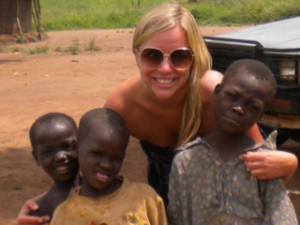 My three new best buds from Paloga: Jan, Kevin, and Prossy. So, as we approached the town center in Paloga, three kids in particular, Kevin (females have taken this name in Northern Uganda – interesting!), Jan, and Prossy immediately responded to my attempt to give them a high five, teach them how to fist bump, and blow kisses. Here, I also met my first female friend from Paloga, Amarena. She didn’t speak any English but was with us throughout the entire day, and after our first stop, became my official Acoli-language teacher. Everywhere we went she would say Iy-rin (that’s the Ugandan pronunciation, apparently. The “air†sound of Erin is too difficult for people to pronounce and, frankly, I like my name better without it), and then she would tell me a word or phrase to say after her. I would just repeat whatever she said and then the whole group would laugh. I honestly felt like a two year old just learning how to talk. It’s quite hilarious though, and I like to make people laugh, so I’ll take it! Honestly, though, I did learn quite a few words today – for example, “dung, dung†means “bye-byeâ€.
The town of Paloga is beautiful in and of itself. It is among the mountains which are massive and littered with waterfalls. Sadly though there are quite a few people left in the camps, which I got some video footage of today. As we check water I’ve been in quite a few huts, and let me tell you, while they are functionally sound, they are not big at all. They are not meant for sitting around and watching TV or checking your email (and no one, literally no one, has computers or TV, anyway). So, the huts are disgustingly close together and it is clear that this is no way to live. There is poop everywhere and no where to grow crops, which is how people survive here. The irony is that there is so much land and these people, some of them at least, are still so close in proximity, all because of very horrifying and realistic fear that has haunted this place for years. Only evil can do such a thing to people living in such a rich and fruitful environment.
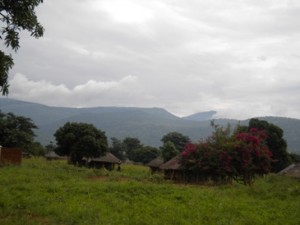 The beautiful village of Paloga. After making our rounds in the village, we returned to the town center for another formal lunch. The children were still there and ready to play. As they warmed up to me, they started to hug me, let me spin them around, and chase them a bit. As we sat down, they started to pick up on the fact that I did not know Acoli. They started to point at things and say the Acoli word for it, repeating it again and again until I got the pronunciation right. They taught me the words for all the body parts as well as how to count to ten. Before you know it, I looked up and was surrounded by about 18 little African kids, engaged, fist bumping, high five-ing and blowing kisses. The oldest of them all, Kevin, was quietly counting my toes in English which made my heart break. Clearly, she has had some schooling, but just couldn’t afford to continue.  (If I could, I would definitely have taken all of these kids back to America with me.)
For lunch, we went into one of the church-owned huts to eat with the parishioners and get feedback on the projects that we are interested in initiating next. This was the first time I saw African instruments – they were beautiful things made out of all natural materials, being stored there for the church services. I am definitely looking forward to Sunday mass!). A little girl, Sophia, one of the counsel women’s daughters snuck in and slipped right onto my lap while her little brother sat next to me stroking my hair. Sophia quickly fell asleep and her brother quietly listened to the rest of the meeting blowing me kisses as I had taught him to do. It was a moment I will never forget.
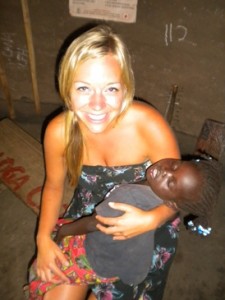 Sleeping Sophia during our Paloga meeting. We prepped the people on our first project for this trip: soap making. On Monday, Shawn will be teaching the people how to make soap out of materials that they (mostly) have right here. They can use the sunflower oil and shea butter oil from the trees and we will have to provide the lye. The people were very interested, as soap is an expense that they must part with often and it will be a blessing for them to save both cash and a long walk to town. They, too, are extremely interested in a sunflower press, but there is so much work yet to be done (and money to be raised) for us to help them reach such a goal. Looks like we’ll be serving Uganda Blend at Pewaukee every Friday next year! (I’m thinking of picking up some real Ugandan coffee for our “Coffee House†next year before we return.)
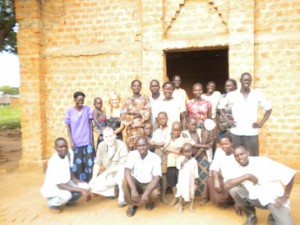 Shawn and I with the people of Paloga. This evening Shawn helped two extremely wonderful young men who volunteer for the parish, Michael and Augustine, to set up the internet café, as I sat outside watching the sunset, working on the blog. Of course, the children walked past, stopped to chat, and wanted to see the computer. I began to show them the pictures from Padibe, but they kept asking to see pictures of snow! I tried to access my facebook account, hoping that I might have some there, but I do not. If any one thinks of it, please send me pictures of snow!  The children surrounding me multiplied, and they were fascinated that people from the US were communicating with me via this little black thing on my lap. The internet café is also another great idea that will help these people so very much (we are using a generator to power it). Some parishioners, and the group Extendicare have donated all of the materials, computer, printer and all, and now we just have to figure out the logistics: how much we will charge people to use it, who will be working the cafe, what we will do when we cannot receive a connection, etc.
Every day I am here, I am so proud of all the work Three Holy Women has already done here before my time, especially that pretty wonderful man, Shawn Alexander. There is so much work to do and things are always complicated, but this is the work that keeps me alive and awake in my short time on this earth. So, onward we go. The traditional music festival (dancing and all) is tomorrow.
Thank you for all of the prayers and support. Much love to those following us in the States (and Thailand!).
We spent most of the day traveling again, making sure that the water filtration systems were working properly, as well as made a few stops at some schools. We ended the day with a ceremony to deliver the medical supplies and funds from PHS to the medical clinic as well. I will very directly summarize the aforementioned topics below.
Madi Kiloc
The town we visited today, from my experience, was much different from the others – seemingly smaller and more rural which is all based on my narrow perspective. It took forever to get out to some of the huts – long drives on dirt roads full of potholes through fields and fields of brush and agriculture. It is quite difficult to imagine what people do when they need to get to town with goods on their heads and babies on their backs, or if they are in need of medical aide in an emergency. It is quite ironic, however, to see solar panels installed outside of the huts in order to charge the cells phones or charge one light bulb for the evening – did I mention that there is no electricity here? We must walk around with “torches†as they say in order to see in the dark.
Formal Acoli Meeting
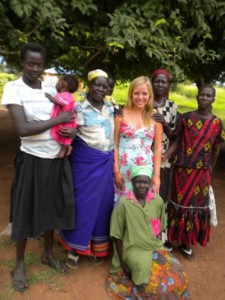 The wonderful women of Madi Kiloc and I. After our visits, we had a very formal lunch with the catechists and elders of the community in order to discuss the future plans of our sister parish relationship. I am always amazed by the women and how much work they have – all the time. It’s crazy to think that most all of them harvest the crops, wash clothes by hand, care for the children, cook the food, clean the dishes in a basin of water, walk to town, prepare meals for all of us, wash our hands for us before and after each meal, bring us the food, remove the plates and bring them all the way back home. The meetings, I should add, are all very prescribed and rhetoric is important to the people. Each one will begin with a greeting from every person present, then the visitors (Shawn and I) may say something to the group (the whole time this is translated back and forth between English and Acoli). To be honest, it feels like we are at a school board meeting everywhere we go. 🙂 Anyway, it takes a good amount of time to hear from all the people (mostly men, not surprisingly) but the people have good insights to offer us that will hopefully lead to the next tree that will bear fruit, so to speak. The whole time I am sitting in the “guest of honor chair†I cannot help but notice the women who have served us who remain on the ground and slyly chat with one another. My heart is truly down there with them and this proved to be true when after the meeting they grabbed me, hugged me, taught me some Acoli words, decidedly called me their American daughter in broken English, and asked for picture after picture. These women are loving and open, they work hard at home and yet are interested in doing what is right for the community; they are composed and elegant; and while I know they too are also human, I want to be just like them.
School Visits
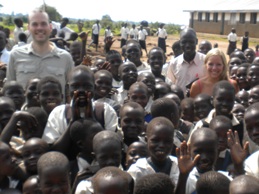 Shawn and I - the only muzungus in a sea of Ugandans! So I decided today that I need to start getting involved with the schools here so that I can see what sort of projects we may be able to start here. The plan for today was to stop in a few schools and set up some dates and times that I can come next week so that I can get a feel for the role that either PHS or Three Holy Women can play here (Shawn and I are also kicking around the idea of coming for the full summer next year and if that is the case I will more than likely teach in one of the schools). So first we stopped at the Primary School in Madi Kiloc and headed straight to the head master’s office to introduce ourselves. Unfortunately we walked right into a student disciplinary meeting with the parents, and the looks on their faces were truly no different than those of Pewaukee students facing a similar fate. I was astounded at the hand written butcher paper of the school’s vision and mission, as well as the school enrollment. Also, there were what we would call “public service announcement†posters about teen pregnancy, school drop-outs, and the danger of keeping students home to work instead of sending them to school. These “normalcies†are fascinating to me because they seem to close to home and yet so different.
It is clear, however, that these children are dirt poor and we shortly learned this as we toured the schools. The children are dirty, shoe-less, and yet so full of life. Some of the challenges, according to the headmasters, include having enough text books, keeping students engaged in a science based class because there are no materials available for hands-on demonstrations, students not showing up, teachers not showing up, running out of monies, not having any English teachers available to even hire (so basically, they have gaps in the content areas and not a single person in what we would call the “application poolâ€), not having access to water, the cafeteria workers having to walk too far to get water to make the lunch thus causing the whole schedule to run late, not having materials for when the girls’ menstruate, not being able to discipline students and – literally – one head master’s solution, what they are funding next, is to put up a fence. I was in complete shock. Next week will be eye opening for me, but I am seeing that when the basics, in accordance with Maslow’s Triangle – shelter, food, water – are not met, it is nearly impossible to talk about real-world application of curriculum or setting high standards. After a summer knee-deep in curriculum work and six years at Pewaukee School District, I am in utter disbelief at the despair of these school conditions. But, I think I’m in Padibe for some odd reason, so we’ll see what becomes of my time with them next week.
Medical Clinic Ceremony
After the visits, Shawn and I delivered over $1,000 worth of medicine donated from a parish doctor at Three Holy Women and the monies from the PHS Coffee House for anti-malarial medicine for the children. There was a wonderful reception that included a tour of the medical clinic (where the newest member of Padibe was named Alexander Shawn – the second in the village – at the maternity ward), but, again, the facilities are nothing like that of any American hospital or facility. The Padibe parishioners were so grateful and even sang us a song of thanks and gratitude that they wrote themselves for all of the help that we are supplying. They continually send love and thanks back to the people of America. We got most of the ceremony on video so that we can show all of the people back home how much love and thanks lies within the people here.
That pretty much sums up the day today. We will be experiencing the beginning of the long-awaited district music festival tomorrow and Saturday. We cannot wait!
Tommy had his visa interview today and he passed! Thanks be to God!!! What a chore it was, but thanks for everyone that helped. Most especially, thanks to Manny Vazquez and Ginger Kollmansberger at the office of Senator Ron Johnson for helping with a letter of support to the US Embassy in Kampala.Â
Get Milwaukee ready – Tommy’s coming to town in October!!!
|
Internal
Partnership
|












